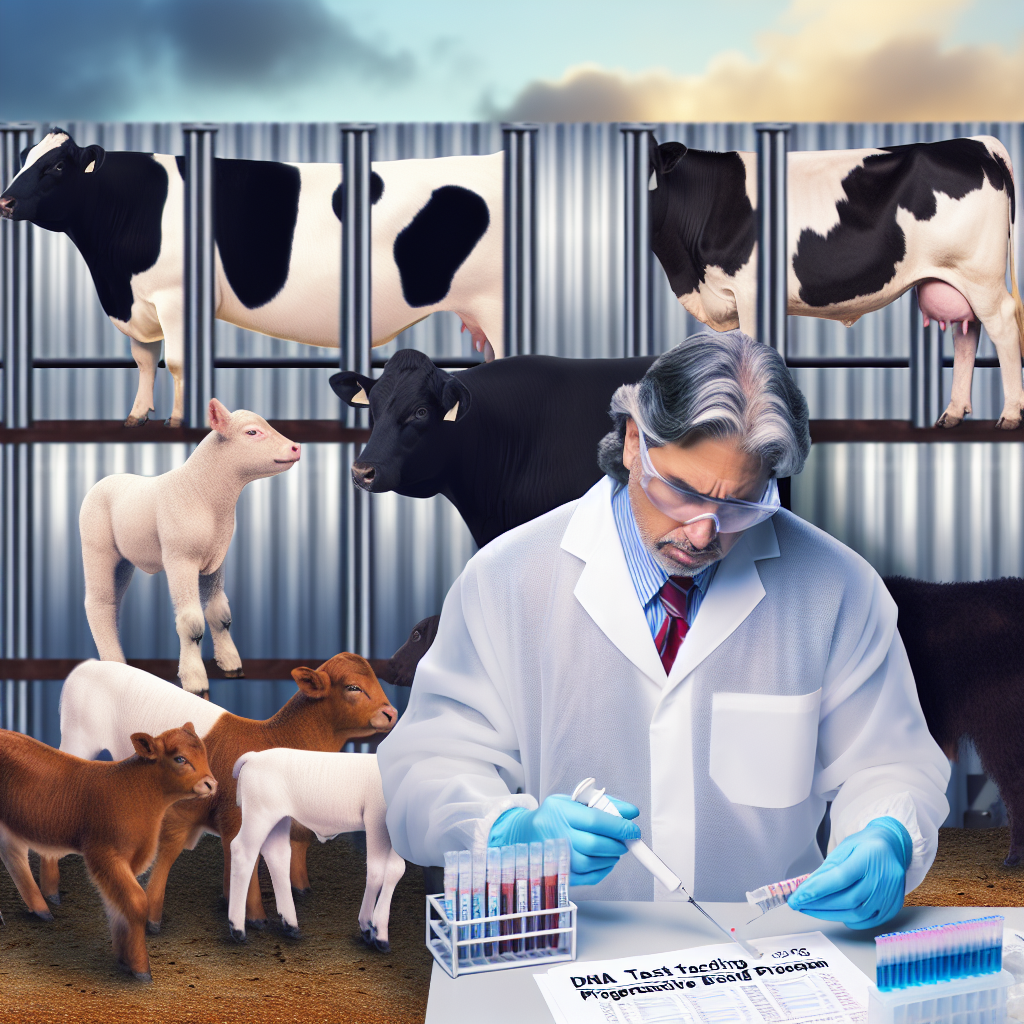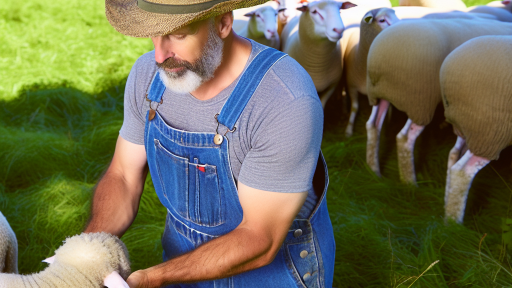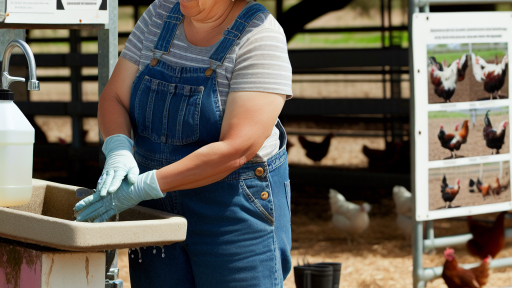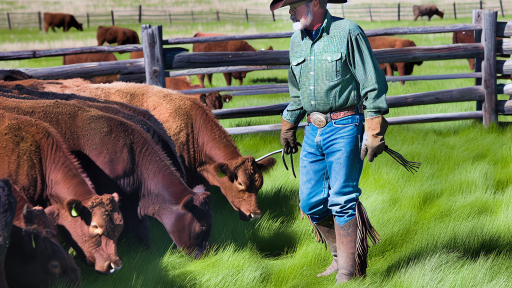Introduction to DNA Testing in Livestock Breeding
DNA testing is revolutionizing livestock breeding programs.
This technology offers precise data on animal genetics.
Farmers can use this information to enhance breeding strategies.
Consequently, they improve livestock quality and productivity.
Genetic Insights
DNA testing provides deep insights into genetic traits.
It enables breeders to understand inheritance patterns.
Specific traits may include disease resistance and growth rates.
Additionally, breeders can track genetic diversity.
Improved Decision Making
The use of DNA testing leads to better mating decisions.
Farmers can select animals with desirable traits more accurately.
Therefore, the overall herd quality improves over time.
This approach reduces the risk of inbreeding.
Cost-Effectiveness
Implementing DNA testing can be a cost-effective strategy.
Initially, it may require upfront investment in technology.
However, the long-term benefits outweigh these costs.
Transform Your Agribusiness
Unlock your farm's potential with expert advice tailored to your needs. Get actionable steps that drive real results.
Get StartedFarmers experience increased productivity and profits.
Future Trends
Advancements in DNA testing continue to emerge.
New technologies allow for even more precise genetic analysis.
As these tools become more accessible, adoption rates will rise.
This shift will reshape livestock breeding practices globally.
Benefits of DNA Testing for Breeding Programs
Improved Genetic Selection
DNA testing allows breeders to select animals with desirable traits more efficiently.
This process enhances the overall genetic quality of the herd.
Consequently, it leads to better productivity and performance in livestock.
Enhanced Disease Resistance
DNA testing identifies animals that carry genes for disease resistance.
This helps minimize health issues within the herd.
Ultimately, disease-resistant livestock can result in lower veterinary costs.
Accurate Parentage Verification
DNA testing provides definitive proof of parentage in livestock.
Accurate lineage information is crucial for breeding programs.
This ensures that breeders maintain proper genetic lines and avoid inbreeding.
Increased Breeding Efficiency
By using DNA analysis, breeders can make informed mating decisions.
This approach increases the likelihood of producing superior offspring.
Moreover, it reduces the time and resources spent on trial-and-error breeding.
Cost-Effectiveness in the Long Run
While initial DNA testing may seem costly, it offers long-term savings.
Utilizing genetic information helps avoid unproductive pairings.
This increases the efficiency of the breeding program and reduces operational costs.
Facilitating Data-Driven Decisions
DNA testing provides breeders with substantial data for analysis.
Data-driven decisions enhance breeding strategies and outcomes.
Furthermore, this information empowers breeders to adapt to market demands.
Types of DNA Tests Used in Livestock Breeding
Genetic Profiling
Genetic profiling identifies the unique genetic makeup of an individual animal.
Showcase Your Farming Business
Publish your professional farming services profile on our blog for a one-time fee of $200 and reach a dedicated audience of farmers and agribusiness owners.
Publish Your ProfileThis process aids breeders in selecting animals with desired traits.
Moreover, it helps in tracking pedigrees more accurately.
Parentage Testing
Parentage testing confirms the biological parents of an animal.
This test provides clarity in breeding and enhances lineage verification.
It is particularly useful in managing breeding programs effectively.
Trait Testing
Trait testing assesses specific characteristics that may affect productivity.
For instance, tests can reveal genetic predispositions to diseases or performance traits.
Thus, breeders can make informed decisions regarding animal selection.
Genomic Selection
Genomic selection employs DNA data to predict the breeding value of animals.
It considers multiple traits simultaneously, increasing the precision of selection.
This approach accelerates genetic progress in breeding programs.
Marker-Assisted Selection
Marker-assisted selection uses specific DNA markers associated with desirable traits.
This technique enhances breeding efficiency by identifying favorable alleles.
Consequently, it allows breeders to select animals with higher likelihoods of success.
Whole Genome Sequencing
Whole genome sequencing analyzes the complete DNA sequence of an organism.
This comprehensive view unlocks insights into the genetic basis of traits.
Furthermore, it supports advanced breeding strategies and precision agriculture.
Metagenomic Analysis
Metagenomic analysis explores the genetic material of entire microbial communities.
This technique is beneficial for understanding gut health in livestock.
Consequently, it informs management practices that enhance animal welfare.
Uncover the Details: Sustainable Practices In Livestock Housing
Understanding Genetic Markers and Their Role in Selection
Introduction to Genetic Markers
Genetic markers are specific sequences in the DNA that can help identify traits.
They play a vital role in livestock breeding programs.
By analyzing these markers, breeders can make informed decisions.
As a result, they select animals with desired traits more effectively.
The Importance of DNA Testing
DNA testing has revolutionized livestock breeding.
This method allows for precise identification of genetic traits.
It also helps in understanding the genetic diversity within a herd.
Consequently, breeders can manage their breeding programs efficiently.
Types of Genetic Markers
There are several types of genetic markers used in livestock breeding.
- Single Nucleotide Polymorphisms (SNPs) are the most common markers.
- Microsatellites provide information about genetic diversity.
- Insertion-deletion (Indel) markers also play a significant role.
These markers help in predicting the performance of livestock.
Application of Genetic Markers in Selection
Using genetic markers improves the selection process for breeders.
They can identify animals with superior genetics.
This includes traits like growth rate, disease resistance, and reproductive performance.
Moreover, it reduces the time required to achieve breeding goals.
Challenges and Considerations
While DNA testing offers many advantages, challenges exist.
One challenge is the cost of testing, which can be high.
Additionally, interpreting genetic data requires expertise.
Therefore, breeders must invest in training and technology.
The Future of Livestock Breeding
The future of livestock breeding looks promising with DNA testing.
Showcase Your Farming Business
Publish your professional farming services profile on our blog for a one-time fee of $200 and reach a dedicated audience of farmers and agribusiness owners.
Publish Your ProfileAs technology advances, testing will become more affordable.
This will enhance the ability to produce high-quality livestock.
Ultimately, the use of genetic markers will lead to sustainable farming practices.
Learn More: Flooring Options For Livestock Housing
Implementation Strategies for Integrating DNA Testing
Understanding DNA Testing
DNA testing offers valuable insights into livestock genealogy.
This testing identifies genetic traits important for breeding.
It also helps in detecting hereditary diseases in animals.
Additionally, DNA testing enhances the accuracy of breeding programs.
Setting Goals for DNA Testing
Establish clear objectives before integrating DNA testing.
Identify the specific traits you want to enhance.
Furthermore, determine how these traits affect overall productivity.
Engage stakeholders in the goal-setting process for broader support.
Choosing the Right Testing Partners
Select reputable laboratories that offer DNA testing services.
Ensure the lab has experience with livestock genetics.
Moreover, review the lab’s turnaround times and pricing structure.
Finally, consider seeking recommendations from fellow breeders.
Implementing a Sample Collection Process
Design an efficient sample collection protocol.
Collect samples in a way that minimizes stress for the animals.
Ensure proper labeling and documentation of each sample.
Additionally, train staff on the collection and handling procedures.
Interpreting Test Results
Develop a framework for analyzing DNA test results.
Compare the genetic data against your breeding goals.
Work with geneticists to better understand the implications.
Moreover, share findings with your breeding team for collective decision-making.
Integrating Results into Breeding Decisions
Use test results to make informed breeding choices.
Select animals based on genetic merit rather than appearance alone.
Monitor breeding outcomes to assess the impact of genetic choices.
Continue refining selection strategies based on these outcomes.
Monitoring and Adjusting the Program
Regularly assess the effectiveness of your DNA testing program.
Gather feedback from team members involved in the process.
Adjust your strategies based on lessons learned from breeding results.
Additionally, stay updated on new advancements in DNA testing technology.
Gain More Insights: Choosing The Right Waste Management System

Case Studies: Successful DNA Testing Programs in Cattle and Pigs
DNA Testing in Cattle Breeding
One exemplary program took root at Oakwood Farms.
This farm implemented DNA testing to enhance cattle genetics.
Farm managers identified superior traits effectively through genetic markers.
As a result, they improved growth rates and disease resistance.
Another successful initiative emerged from Green Valley Ranch.
They developed a comprehensive genetic database for their cattle.
This database facilitated informed breeding decisions based on data.
Showcase Your Farming Business
Publish your professional farming services profile on our blog for a one-time fee of $200 and reach a dedicated audience of farmers and agribusiness owners.
Publish Your ProfileConsequently, the herd’s overall productivity increased significantly.
Impact on Herd Quality
Farmers noted marked improvements in herd quality over time.
For instance, enhanced lineage tracking allowed better mating pairings.
Progeny testing produced long-term benefits for future generations.
Additionally, the program reduced instances of inherited diseases.
Overall, DNA testing revolutionized selection processes in cattle breeding.
DNA Testing in Pig Breeding
In the swine industry, DNA testing made significant strides as well.
For example, Smithson Farms utilized DNA markers to select breeding stock.
This targeted selection improved both growth performance and meat quality.
Furthermore, they implemented genomic selection across their breeding program.
This approach accelerated trait improvement within a single generation.
Strategic Partnerships and Innovation
Collaborations with genetic testing companies optimized their strategies.
These partnerships provided access to advanced testing technologies.
As a result, Smithson Farms remained at the forefront of innovation.
Farmers noted increased market competitiveness due to their enhanced products.
Real-Life Success Stories
Data from these farms illustrates the tangible benefits of DNA testing.
For example, Oakwood Farms reported a 20% increase in milk production.
Similarly, Smithson Farms saw improvements in feed efficiency by 15%.
Clearly, DNA testing has reshaped livestock breeding programs.
See Related Content: Optimal Housing Solutions for Beef Cattle
Challenges and Limitations of DNA Testing in Livestock
Technical Barriers
DNA testing technology can be complex and costly for many farmers.
Some livestock producers may lack access to necessary equipment.
Additionally, understanding the technology can be a challenge.
Training staff on DNA testing processes can further strain resources.
Data Interpretation Issues
Interpreting DNA test results requires specialized knowledge.
Many producers may find it difficult to understand genetic data.
This can lead to misinformed breeding decisions.
Moreover, the potential for misinterpretation can undermine confidence in testing.
Cost Considerations
DNA testing can entail significant upfront costs for producers.
Budget constraints may limit testing frequencies.
Some farmers may prioritize immediate needs over genetic testing expenses.
Ultimately, cost can hinder the widespread adoption of DNA technologies.
Ethical and Regulatory Concerns
As with any biotech, ethical questions arise regarding genetic manipulation.
Some stakeholders may resist DNA testing due to potential bioethical implications.
Regulatory hurdles may also complicate the process of DNA testing in livestock.
Compliance with existing regulations may require additional resources.
Limited Scope for Some Breeds
Not all livestock breeds benefit equally from DNA testing.
Some commercial breeds have a wealth of genetic data available.
However, less popular breeds may lack comprehensive testing resources.
This limits the potential advantages of DNA testing for small-scale breeders.
Showcase Your Farming Business
Publish your professional farming services profile on our blog for a one-time fee of $200 and reach a dedicated audience of farmers and agribusiness owners.
Publish Your ProfileFuture Trends in DNA Testing and Genetic Improvement
Advancements in Technology
Recent advancements in DNA sequencing technology have improved accuracy.
Next-generation sequencing allows for faster and cheaper analysis.
This technology significantly enhances our understanding of genetic traits.
Furthermore, it helps identify desirable traits in livestock more efficiently.
Integration of Genomics and Data Analysis
The integration of genomics with data analysis is reshaping breeding programs.
Big data analytics enables better decision-making in genetics.
Livestock producers can now leverage genomic information for precise breeding.
Moreover, this approach enhances the selection of superior livestock.
Personalized Breeding Strategies
Personalized breeding strategies are becoming increasingly popular.
Farmers can tailor breeding approaches based on individual genetic profiles.
This customization leads to enhanced genetic gains in herds.
Additionally, it mitigates health issues and improves overall livestock performance.
Collaboration and Research Initiatives
Collaboration among researchers and producers is essential for progress.
Shared knowledge accelerates the discovery of beneficial genetic traits.
International research initiatives focus on global livestock improvement.
These partnerships enhance the utility of DNA testing in various contexts.
Sustainable Practices
The trend towards sustainability plays a crucial role in livestock genetics.
DNA testing helps identify traits that promote environmental resilience.
For example, drought resistance and feed efficiency are critical traits.
Additionally, improving animal welfare remains a priority in breeding programs.
Future Implications for the Industry
The future of DNA testing promises substantial industry advancements.
Consumers will benefit from healthier meat and dairy products.
Moreover, this technology fosters ethically responsible farming practices.
The livestock industry will continue to evolve through genetic innovation.




